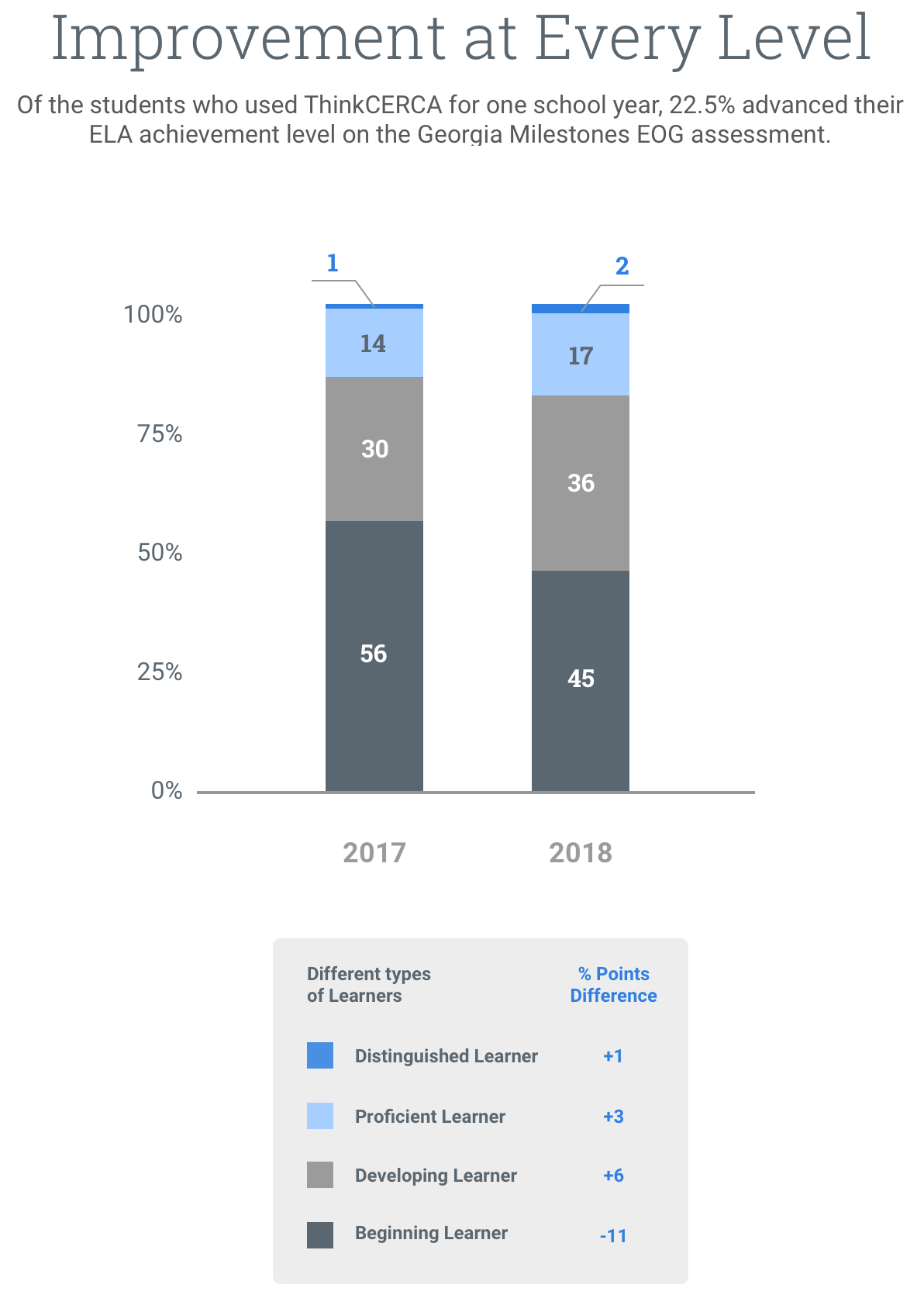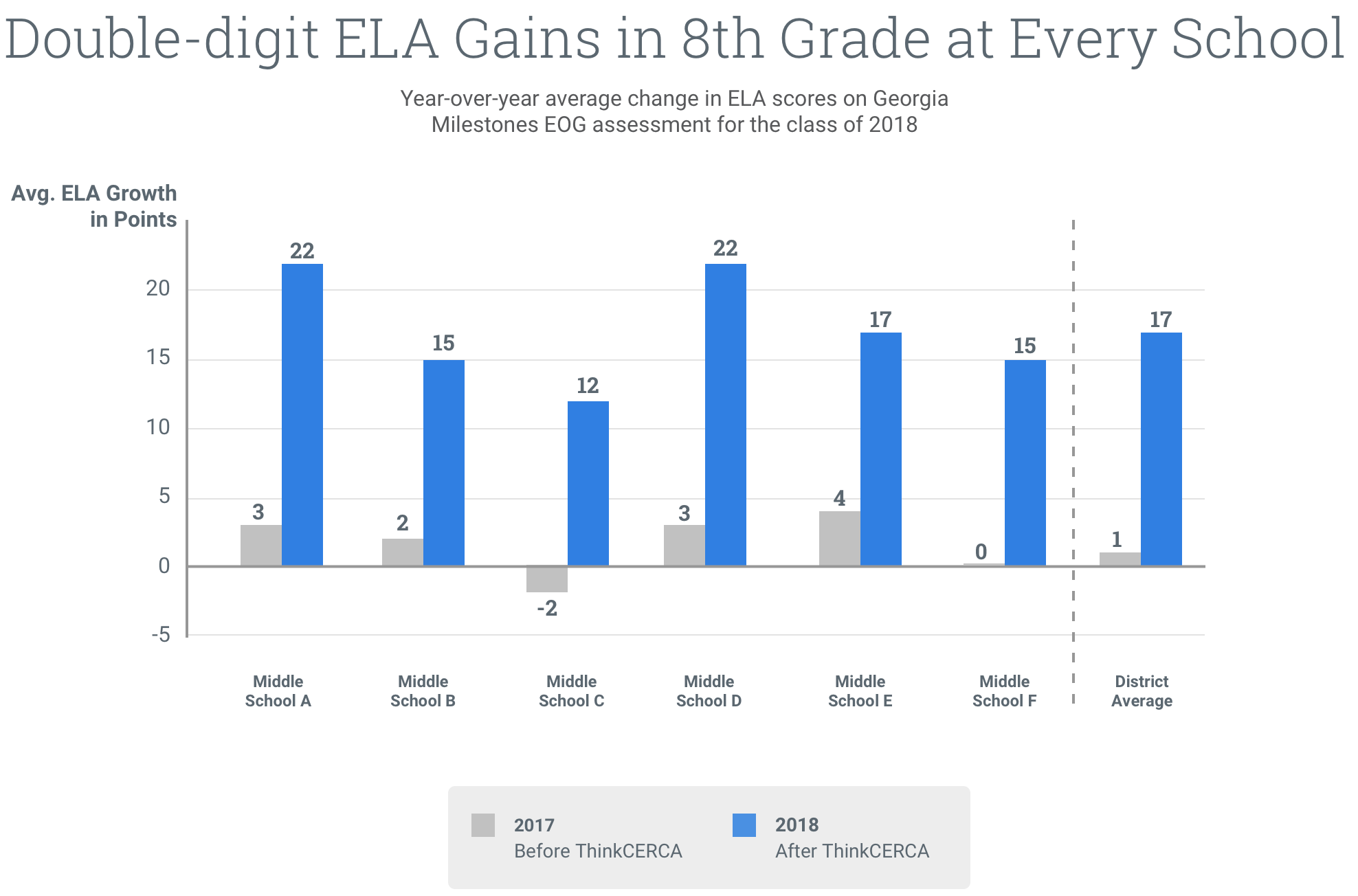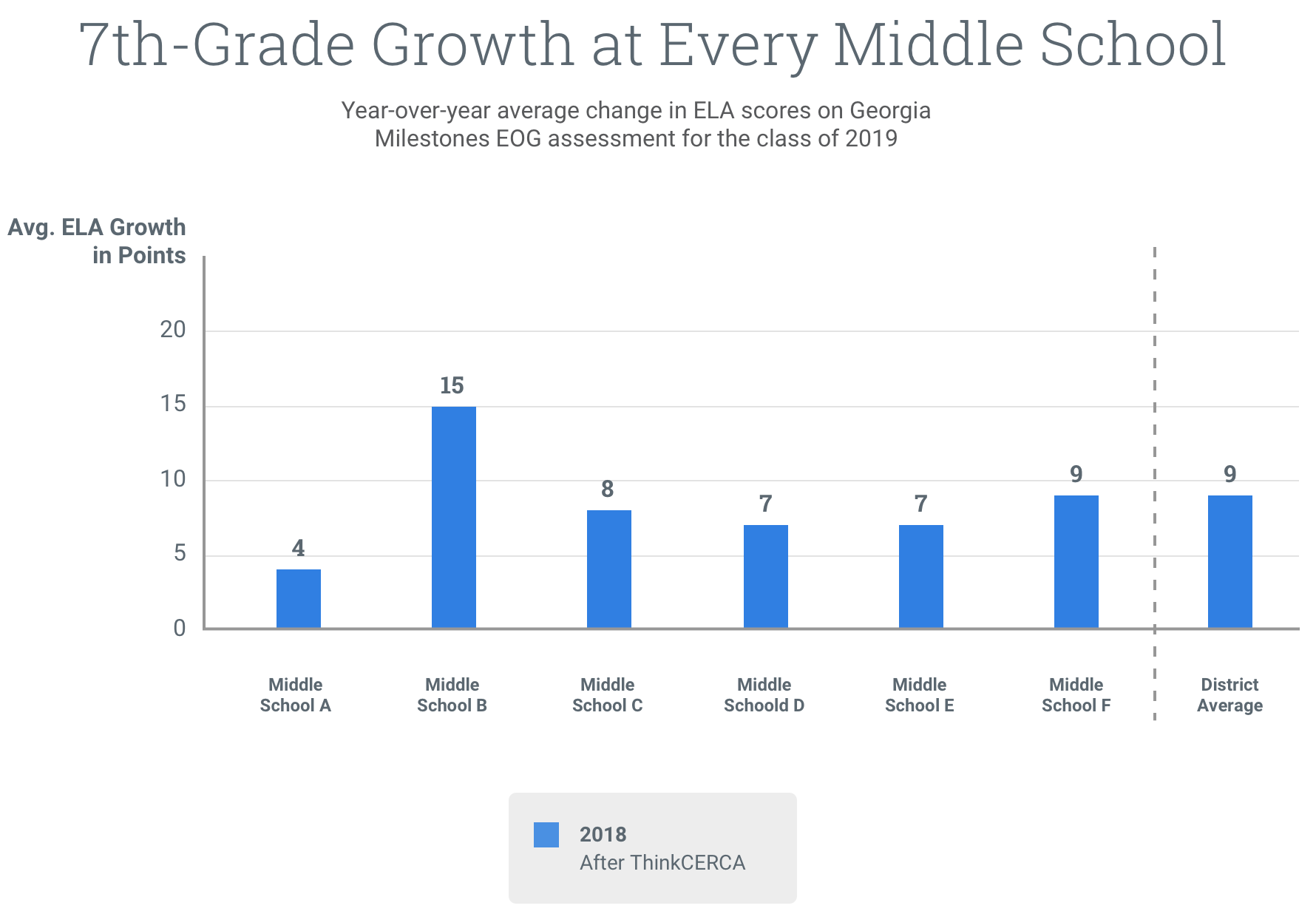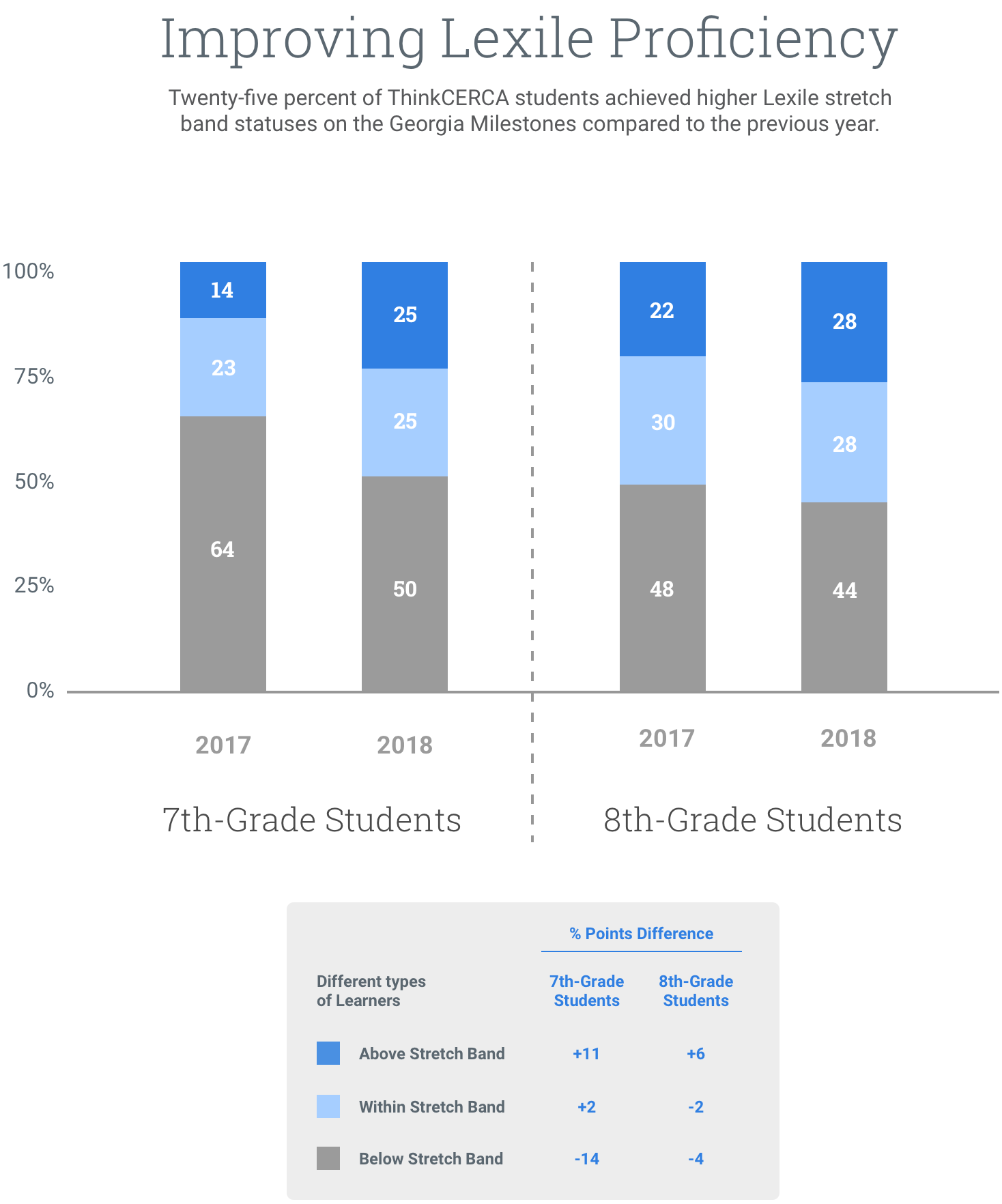Bibb County Case Study
Consistent Writing Instruction Leads to Major Growth
After partnering with ThinkCERCA for one year, Bibb County School District achieved double-digit gains on Georgia Milestones.
Key Takeaways
In 2018, after one year of using ThinkCERCA at six middle schools in Bibb County:
-
All middle schools saw positive student growth on the English language arts (ELA) portions of the Georgia Milestones end-of-grade (EOG) assessment, which measures depth of knowledge in reading, vocabulary, writing, and language.
-
Among the students who used ThinkCERCA, 22.5 percent moved up one or more achievement levels on the ELA assessment.
-
Specifically, 8th-grade students gained an average of 17 points on the Georgia Milestones EOG ELA assessment compared to 1.2 points gained in 2017.
Download the Case Study
District Demographics
99%
Eligible for Free/
Reduced Meals
49%
Female
51%
Male
73%
Black
18%
White
5%
Hispanic
5%
Asian, Native American, or Multiracial
Download the Case Study
The Challenge
Like many school districts today, Bibb County in Georgia knew that their middle school classrooms needed to provide more rigorous literacy instruction to students. By the end of the 2016-17 school year, Bibb County’s middle school ELA growth was nearly stagnant, with 7th-grade students gaining an average of just 1.2 points on the Georgia Milestones ELA assessment compared to the prior year.
“Strategically, our middle schools have been the greatest area of need,” Dr. Curtis Jones, superintendent of Bibb County, said. “Parents trusted us with their children in elementary school, left us in middle school, and generally, returned in high school. After looking for root causes, I determined one root cause that needed to be addressed was classroom rigor.”
"We knew we needed to do something differently at the middle school level."
After reviewing Georgia Milestones data, the Bibb County team assessed how literacy instruction was being incorporated into regular classroom practice and observed how writing was being taught across the district.
“When we conducted learning walks and instructional rounds, we noticed each school was approaching writing instruction in a different manner,” Dr. Tanzy Kilcrease, the assistant superintendent of teaching and learning at Bibb County, said. “There was no consistent manner for taking students through the writing process and ensuring that they have an understanding of how to effectively write a response or a claim. It was not consistent from school-to-school. The scores were not consistent either. Therefore we knew we needed to do something differently at the middle school level.”
Bibb County did do something different. Recognizing the importance of a consistent approach to writing instruction, the district team searched for a solution that could provide students with a common framework for engaging with literacy. It was at this time that they were introduced to the CERCA Literacy Framework, and ThinkCERCA’s curriculum of content-specific literacy lessons.

After hearing positive feedback from a former principal of a school that partnered with ThinkCERCA, Bibb County embarked on a three-year strategic partnership with ThinkCERCA. The partnership, launched in the 2017-18 school year, was designed to help middle school teachers deliver rigorous literacy instruction in all core subjects.
The Implementation
As a district-wide initiative, strong leadership in the Bibb central office – led by Dr. Curtis Jones, the 2019 National Superintendent of the Year – set the expectation for continuous improvement of writing instruction and performance in every school.
The Bibb County district team understood that literacy goes beyond reading comprehension. Literacy encompasses writing, speaking, and listening, and can truly amplify instruction in every subject. By partnering with ThinkCERCA in the summer of 2017, Bibb County made sure that middle school teachers in all core subjects – math, science, social studies, and ELA – had access to expert-designed, content-specific literacy lessons.
"ThinkCERCA helped the teachers understand how to effectively implement literacy throughout instruction."
Furthermore, ThinkCERCA’s team of literacy professionals provided training and support to help all teachers feel comfortable incorporating writing instruction into their everyday practice.
“We knew we needed something that was a little bit more established for us to ensure that literacy is taught across the curriculum,” Dr. Kilcrease said. “ThinkCERCA was perfect because it doesn't just focus on ELA; it's a writing framework for all content areas. We saw it as something that was really going to help us provide teachers with the tools necessary in order for them to be effective at implementing writing across the curriculum.”
ThinkCERCA’s built-in literacy framework – CERCA – also helped students and educators approach writing in one standard manner across the school district. With CERCA, students understood that they should state a claim, back it up with evidence, explain their reasoning, address counterarguments, and use audience-appropriate language throughout the writing process.

“ThinkCERCA helped the teachers understand how to effectively implement literacy throughout instruction,” Dr. Kilcrease said. “Not just one time in one subject area during the year, but throughout the year across the curriculum.”
The ThinkCERCA team also worked with Bibb County to map out a schedule for when and how teachers could incorporate writing into regular classroom practice. The partners worked with school leaders to analyze data and develop instructional plans for students, as well as coach teachers on literacy best practices, such as how to deliver effective feedback. Bibb County also developed a District Literacy Leadership team to share learnings, observations, and advice on writing instruction.
Bibb County recognized that literacy is not a one-year initiative but a multi-year commitment to continuous improvement and rigorous instruction. By establishing processes, holding stakeholders accountable, and targeting areas for growth, the district leadership team ensured that writing became a unified initiative, embedded into instruction and professional development across the middle school community.
The Results
After committing to rigorous literacy instruction, within one school year Bibb County achieved remarkable growth on the end-of-grade Georgia Milestones state assessment.
To understand the impact of ThinkCERCA on these results, ThinkCERCA worked with Bibb leaders to analyze ThinkCERCA usage and its effect on Georgia Milestones performance.¹
Overall Impact of ThinkCERCA
All six Bibb County middle schools engaged in a ThinkCERCA partnership demonstrated growth on the Georgia Milestones EOG ELA assessment. Among the students who used ThinkCERCA, 22.5 percent moved up one or more attainment levels on the assessment.

ThinkCERCA writing lessons completed and teacher feedback provided in the ThinkCERCA platform were important factors for predicting positive student growth on Georgia Milestones. For instance, the analysis determined that for every growth focus a seventh-grade ThinkCERCA student received, their ELA growth increased by 1.48 points. ThinkCERCA’s growth focus feature lets teachers identify and assign an area of growth for students to improve their writing, from organizing ideas to developing conclusions and more.
On average, eighth-grade students in all six middle schools saw significant spring-to-spring growth after ThinkCERCA was implemented. Across Bibb County, eighth-grade students gained an average of 17 points on the Georgia Milestones EOG ELA assessment in 2018. In the prior year, this same cohort of students only gained an average of 1.2 points.

Similar to the eighth-grade students, seventh-grade students in all schools saw positive growth on the ELA assessment. Across the district, seventh-grade students gained an average of nine points. One school in particular gained an average of 15 points. These gains could not be compared to the 2016-17 growth because fifth-grade data was not available for these students.

Across the district, there was little difference between achievement by gender, with male ThinkCERCA students achieving an average growth of 13.8 points on the EOG ELA assessment and female ThinkCERCA students achieving an average growth of 13.45 points.
Reading Growth
Additionally, ThinkCERCA students saw significant improvements in reading. Twenty-five percent of ThinkCERCA students achieved higher Lexile stretch band statuses from the 2016-17 school year. On average, students improved their Lexile reading scores by 103.96 points.

Writing Growth
In the Georgia Milestones writing assessment, more ThinkCERCA students were at or above proficiency in the spring of 2018 compared to the spring of 2017 for all of the writing skills assessed. Moreover, students whose writing scores placed them in the lowest writing proficiency level in spring of 2017 saw the most improvement in writing proficiency attainment in spring of 2018.
Conclusion
After the completion of Bibb County’s first year of partnership with ThinkCERCA, Dr. Kilcrease said the program “has given [students] the confidence that they need in order to know: How do you read a text? Then how do you answer it? How did you find the evidence? And how do you make a claim and stick to that claim?”
In the fall of 2018, Bibb County began its second year of literacy implementation with ThinkCERCA, aiming to expand usage as part of its goal towards continuous improvement. As part of the second-year initiative, district leadership has emphasized with teachers the importance of incorporating engagement, discussion, and feedback into the writing process.
Dr. Curtis Jones noted that before partnering with ThinkCERCA, “Students were not demonstrating the academic growth parents wanted to see. ThinkCERCA addressed this directly. ThinkCERCA gave our students a way to analyze and respond to written passages that cited evidence, considered the counterargument, and the audience. Our students started using this framework in other areas and the quality of classroom instruction increased accordingly. I am very glad we decided to implement ThinkCERCA in our middle schools.”
